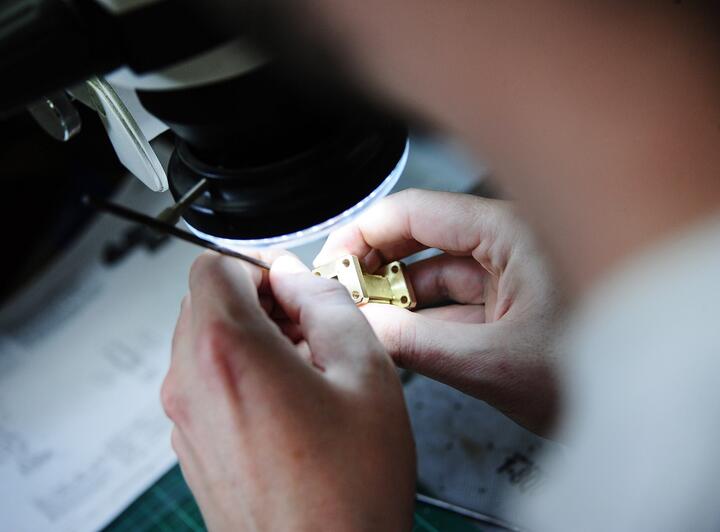AMRC engineers de-risk machine tool selection for space sector manufacturer
16 April 2021A manufacturer of high-precision components for satellite and earth-based communication systems has been helped to de-risk and explore options for a new cutting-edge machine tool thanks to support from engineers at the University of Sheffield AMRC.
Flann Microwave, based in Cornwall, produces very tightly toleranced microwave and millimetre-wave components, sub-assemblies, calibration kits, and instrumentation to sectors including space and research.
The business contacted the University of Sheffield Advanced Manufacturing Research Centre (AMRC) for independent advice to help them move forward in their selection of a new machine tool. A machine tool trade study and zero-point fixturing recommendations were supplied to Flann Microwave at the end of the project, with recommendations for desirable machines and appropriate fixturing.
Emma Parkin, Project Engineer at the AMRC, said: “This project was all about the production of a comprehensive trade study, exploring what Flann Microwave needed from a new machining tool, and researching the best options available. We looked at a range of things Flann wanted to achieve and were able to recommend a number of possible manufacturers they could work with.
“It’s a big investment for a business to buy a new machining tool of this kind, and we supported them not only with our technical expertise and experience, but also the extra resource to pause and spend some time looking at what good options would be. A busy company like Flann really benefits from this sort of support, helping them step out of their day-to-day work and consider what will serve them best in the future.”
The AMRC is part of the High Value Manufacturing (HVM) Catapult network of research centres. The project was paid for using funds for HVM Catapult as part of a commitment to support smaller and medium-sized businesses.
Steve Chesson, Machine Shop Supervisor at Flann Microwave Ltd, said: “The components we make are difficult to manufacture and measure, mainly because they must be produced to a precise and often very small size. We’re talking fractions of millimetres for components used in satellite communications in space, or in mobile antennas.
“We don’t produce large quantities, so even though some of our machining tools are more than ten-years-old, they are as good as new. The issue is that the technology has moved on in that time, and we wanted to work with the AMRC to open a door and explore options for the future.
“The engineer we worked with, Emma Parkin, was great at showing us what’s possible with the very newest technology available and introducing us to options for our next big machining tool purchase. We’re now working with some of the original equipment manufacturers (OEMs) Emma suggested on feasibility studies. Our work with the AMRC definitely took us several important steps towards making the right choice.”

